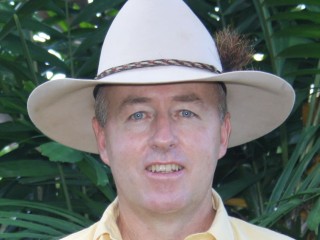 The Northern Territory Live Export Association has signalled its focus on rebuilding North Australia’s live export trade with the appointment of a new chief executive officer, Bernie Brosnan, who has just returned from a week long trade visit to Indonesia with industry stakeholders.
The Northern Territory Live Export Association has signalled its focus on rebuilding North Australia’s live export trade with the appointment of a new chief executive officer, Bernie Brosnan, who has just returned from a week long trade visit to Indonesia with industry stakeholders.
Mr Brosnan brings a wealth of industry experience to the role. He has previously served as livestock co-ordinator for Heytesbury Live Exports, a director of NT based exporter South East Asian Foods, operations manager of AustAsia, and was most recently with Ray White Rural in Darwin.
Other changes announced at yesterday’s NTLEA annual general meeting in Darwin include the appointment of immediate past CEO Kevin Mulvahil to the position of chairman, while the new executive is Nick Thorne from Cedar Park Export Depot; James Leftwich from Austrex; Fred Troncone from Wellard Rural Exports; Ian Bradford from SEALS and Ashley James from the North Australia Cattle Company.
The northern livestock export industry is currently undergoing a period of transition with plans well progressed towards the development of a Northern Australian live export industry association to represent all industry stakeholders across the NT, northern Queensland and northern WA. Those plans are expected to take shape later this year.
Mr Brosnan said he was looking forward to his new role and was keen to help the live export industry regain the ground that has been lost because of last year’s trade suspension.
“My role is to promote the NT Live Exporters Association’s members’ interests and liaise with Government, industry and private interests to enhance all aspects of livestock exports.”
Mr Brosnan said that changes brought about by the implementation of Exporter Supply Chain Assurance System (ESCAS) in Indonesia were clearly evident during his visit to a number of feedlots and abattoirs last week.
“Last week was my first visit to Indonesia since 2003. The work that has been completed by our Indonesian friends over the past 15 months is nothing short of a herculean effort.”
“They are to be congratulated for their commitment to the task in what has been a very tumultuous and difficult time for everyone.”
“ESCAS is working extremely well in delivering first class animal welfare outcomes not only for Australian cattle, but also for local Indonesian cattle whose owners elect to use the same approved abattoirs and that is good news for the domestic herd of Indonesia.
“The slaughter process is now world class and these abattoirs can hold their heads high as they easily compete with the existing slaughter standards in Australian abattoirs.”
Mr Brosnan said the majority of Indonesian stakeholders believe that 500,000 to 600,000 head will be required in the medium to longer term, which is good news for Australian producers. He added that the reduced numbers currently going into Indonesia is likely to continue until after the Indonesian elections in 2014.
“Indonesia will most likely maintain their self- sufficiency focus until then and there are also domestic politics at play in Indonesia which we cannot influence,” Mr Brosnan said.
“The Indonesian people are crying out for more Australian cattle to alleviate very high beef prices, to re-employ those thousands of people that have lost their jobs and to provide long-term security to the thousands of families impacted by last year’s suspension.
“A feedlot we visited that has capacity for 29,000 head is only 35% full and the same applies to the majority of feedlots.”
“This one feedlot used to employ 700 people and the flow-on effect is that 11,000 families in one way or another derived all or part of their income from the feedlot industry – they are hurting.”
“The other big message we received is that Indonesia is very keen to build lasting relationships based around general goodwill, but our relationship has been hammered and we must work hard over the next two years to rebuild mutual trust.”
“They are not looking for quick fixes and handouts; they want to work together in developing longer term projects that will benefit both Indonesian and Australian stakeholders.”
Mr Brosnan said that the industry’s biggest hurdle is overcoming the impact of misleading social media used by animal activist groups like Animals Australia on-line campaigns.
“Globally, primary producers are a minority group,” he said.
“We will never have the voting power that these groups can muster let alone the dollars to lobby governments and politicians.
“We must fight tooth and nail to put the facts before the public so people can make rational decisions and judgements.”
Mr Brosnan said that refining of the audit process for ESCAS was also a challenge for industry.
“The phenomenal cost of ESCAS is not sustainable, industry and government must work together to reduce the cost to a more commercially acceptable level while not jeopardising animal welfare outcomes.” he said.
“We need to be able to reward those that have worked hard to adhere to the implementation of ESCAS, because if we don’t, those importing countries who have adhered over a long period of time, at great cost, will believe that they continue to be penalised and discriminated against when compared to other non-compliant countries.”
